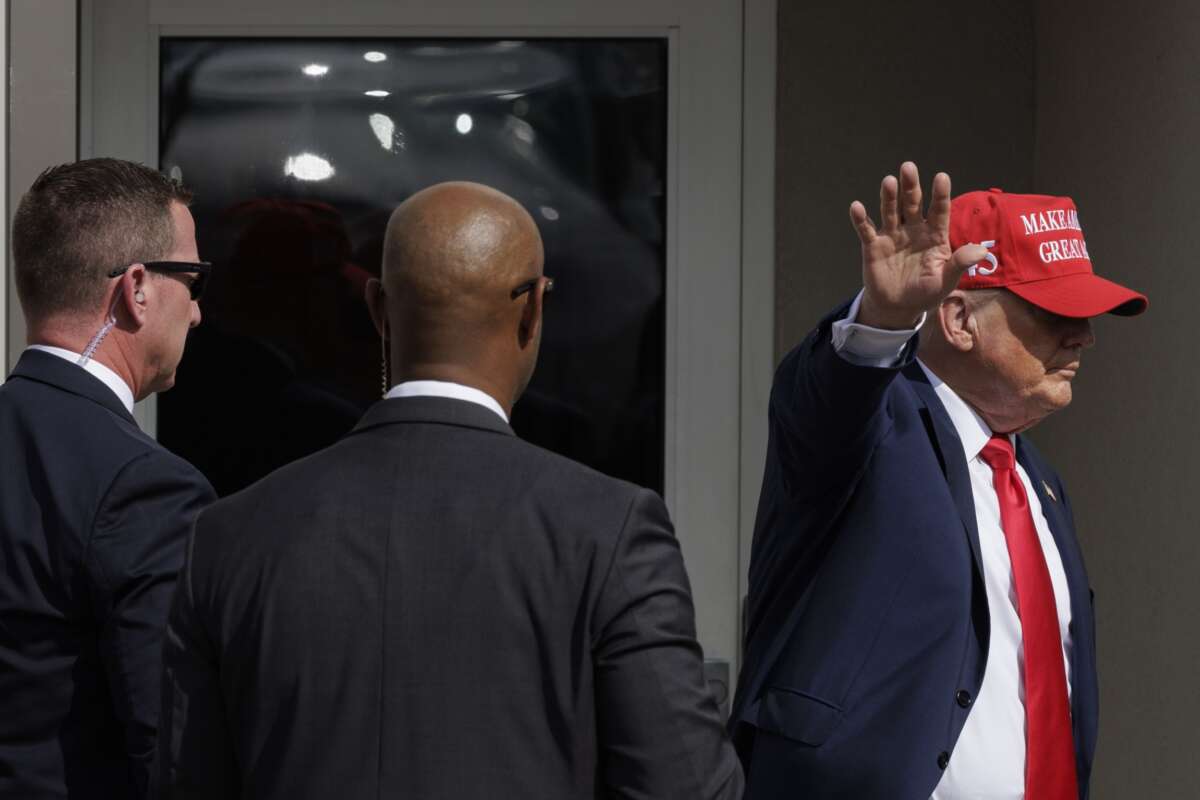Truthout is an indispensable resource for activists, movement leaders and workers everywhere. Please make this work possible with a quick donation.
Former President Donald Trump demanded on his social media platform earlier this week that the government shut down MSNBC News over the network’s criticism of his statements.
Trump’s Truth Social post wrongly claimed that the network is broadcast over the air, thus warranting the government regulation he sought. But the channel is actually a cable news station, and therefore not subject to rules implemented by the Federal Communications Commission (FCC) that apply to over-the-air stations.
“MSNBC (MSDNC) uses FREE government approved airwaves,” the former president falsely alleged, “and yet it is nothing but a 24 hour hit job on Donald J. Trump and the Republican Party for purposes of ELECTION INTERFERENCE.”
Dissent and reporting on a presidential candidate’s statements and actions are not a form of “election interference” — and some observers have noted that Trump happily accepts accolades from right-wing media outlets that engage in the same actions to his benefit.
“Our so-called ‘government’ should come down hard on [MSNBC] and make them pay for their illegal political activity,” Trump added.
Trump’s demands echo comments made by past authoritarian leaders on media they disagree with, and, given Trump’s propensity to publicly praise such leaders, could demonstrate how he intends to govern if he returns to the White House. One needs only to look at how he reacted to negative questioning from CNN’s Jim Acosta in 2018 to reach that conclusion — after Acosta challenged Trump on several issues during a press briefing, Trump rescinded his press credentials, limiting the then-White House correspondent’s ability to report on him. (After CNN threatened a lawsuit, the White House agreed to restore his access.)
Other examples of Trump’s distrust of and attacks on media abound, including:
- His call for the jailing of journalists who published a leaked Supreme Court opinion detailing conservative justices’ plans to overturn federal abortion protections, despite the fact that publishing such leaks is legal;
- Referring to reporters as “fake” after they noted that a heavily edited video he released touting his response to the COVID-19 pandemic had removed comments from journalists noting his failures;
- Regularly (and wrongly) claiming that the reporting of information shared with news organizations by government officials are corrupt leaks (while celebrating such reporting when it was beneficial to him);
- Suggesting early on in his presidency, as he has this week, that news agencies questioning his views or reporting on his actions should have their broadcast licenses “challenged”;
- And calling the press in general the “enemy of the people” in a Twitter rant in 2019.
Critics of Trump blasted his comments this week as disturbing and anti-democratic.
“This isn’t how leaders is democracy behave. This is how fascists act — & we must be alarmed,” Democratic Party strategist Victor Shi wrote on X.
“Trump’s authoritarian, deeply frightening behavior (at least for those who want to continue living in a democracy) has become so normalized that most people simply ignore it,” former U.S. Attorney Joyce Vance said. “We live in a very dangerous moment.”
Steve Benen, a producer for MSNBC, also denounced Trump’s words.
“Trump attacking MSNBC might seem trivial, but the details are not,” Benen pointed out. “He also raised the prospect of using the government to come down ‘hard’ against the network, adding that he considers MSNBC’s journalism to be ‘illegal.’ Authoritarian visions matter.”
A terrifying moment. We appeal for your support.
In the last weeks, we have witnessed an authoritarian assault on communities in Minnesota and across the nation.
The need for truthful, grassroots reporting is urgent at this cataclysmic historical moment. Yet, Trump-aligned billionaires and other allies have taken over many legacy media outlets — the culmination of a decades-long campaign to place control of the narrative into the hands of the political right.
We refuse to let Trump’s blatant propaganda machine go unchecked. Untethered to corporate ownership or advertisers, Truthout remains fearless in our reporting and our determination to use journalism as a tool for justice.
But we need your help just to fund our basic expenses. Over 80 percent of Truthout’s funding comes from small individual donations from our community of readers, and over a third of our total budget is supported by recurring monthly donors.
Truthout has launched a fundraiser, and we have a goal to add 231 new monthly donors in the next 48 hours. Whether you can make a small monthly donation or a larger one-time gift, Truthout only works with your support.
